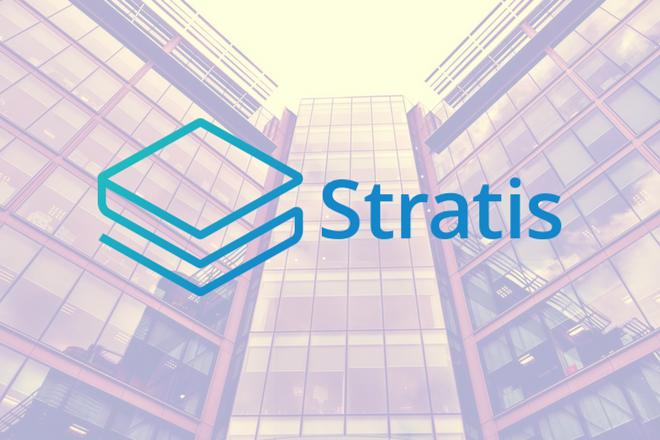Stratis is a very powerful blockchain-as-a-service (BaaS) platform that is focused around the requirements of financial services and other businesses that aim to utilize blockchain technology. Blockchain technology is becoming a revolutionary movement in numerous sectors including medical, financial, and technological. To this end, Stratis is focusing on becoming the most widely adopted BaaS platform.
Why Stratis?
Now you may be wondering: why Stratis? Well, simply put, Stratis allows corporations and businesses to develop their own custom blockchain applications. The aspect that makes Stratis so revolutionary is that these blockchain applications can be developed in C# and make use of the Microsoft .NET framework.
Businesses can use the Stratis sidechains to develop and launch their own blockchain-based applications. This is essential as it allows businesses to build their own blockchain applications without the worries of having to build and maintain their own blockchain infrastructure. In addition, any transactions that occur on a Stratis sidechain don’t run the risk of being ‘bloated.’ The negative effects of this have been seen in the past when Ethereum’s main chain was bloated with transactions from Ethereum-based ICOs, causing severe transaction waiting periods. If ICO’s are to be launched on a platform, the use of sidechains would greatly alleviate this issue – which Stratis has envisioned as part of their goal.
Real world use cases:
Seafood Industry:

Stratis teamed up with Earth Twine on August 16, 2017. This partnership commenced the first dedicated blockchain for origin data and tracking for the international seafood industry. The Earth Twine group will work with Stratis technology to provide a way of tracking mandatory data for IUU fishing compliance. Stratis will create a dedicated blockchain and token to amalgamate international seafood tracking onto the blockchain. The global fish and seafood industry generates large revenues annually amounting to over $100B+. The partnership between Earth Twine and Stratis will ultimately help confirm and validate the information as being true and legitimate. Commencing in January 2018, the data regarding imports and tracking of information will be collected electronically. Stratis will make the process of tracking data in this industry easy and will be highly beneficial for the Earth Twine group as well as further seafood industry organizations down the road.
Medical Research:

The Stratis blockchain could be useful in the medical sector as it will resolve issues regarding publication and research by offering an immutable store of records. Since this information cannot be maliciously altered, researchers and publishers working on medical research can verify the integrity and legitimacy of a record on the Stratis blockchain.
Financial Technology:

Stratis has a lot of ability to shine in this space because the team looks to solve issues such as eliminating the need to put trust into 3rd party escrows, identity management, and KYC (know your customer) compliance by utilizing the powerful blockchain technology. Financial technology is a booming industry that requires privacy and confidentiality. The upcoming Breeze wallet which will enable tumbling of coins will supplement not only individual users that are looking to privatize their transactions, but also greatly benefit businesses and corporations involved in the fintech space.
Stratis vs. Ethereum
There have been many recurring questions regarding the similarities and differences between the Stratis project and the Ethereum project. Although there are some similarities in both platforms, there are also several key differences noted in the following table:

Differences and similarities between Ethereum and Stratis.
Ethereum and Stratis both support smart contracts, but the major difference is the language which these contracts are developed. C# is a common language amongst the software development community, whereas Solidity is not. This ultimately means that the creation of smart contracts on the Ethereum blockchain comes at the cost of having to learn the Solidity programming language – which can be a big burden to developers of businesses, as C# is more recognized and more widely adopted.
History of Stratis:
Stratis was originally founded in the United Kingdom and had a highly successful ICO that took place on June 21, 2016. The company was able to raise nearly $600,000 and at the time of this writing, has an astonishing market capitalization of nearly $1,400,000,000.

The Stratis token which uses the ticker, STRAT, is based off the Stratis blockchain and does not rely on any other blockchain platforms to run off of, as Stratis is fundamentally a blockchain-as-a-service product.
The Stratis Team
Stratis consists of a team of experts in the field with a vast knowledge of the cryptocurrency space and their focus on a C# based platform.
The following list shows a few important members of the Stratis team and their roles within the organization:
Chris Trew (Founder/CEO):
Experienced technologist with over 10 years of experience in Enterprise IT. Specializes in C# technology and has been involved in the blockchain space since late 2013.
Krushang Patel (Head of Communications):
Accumulated over 15 years of experience in retail and international import/export. First discovered Bitcoin in late 2013.
Dan Gershony (Stratis Blockchain Developer):
Over 10 years of development experience focusing mainly on C#/.NET and has contracted for Microsoft and Fujitsu. He first found out about Bitcoin in early 2013.
Jeremy Bokobza (Stratis Blockchain Developer):
Extensive experience with C# development and understanding of the .NET framework.
The complete list of members of the Stratis team and further information regarding this can be found here.
Stratis Roadmap:
Breeze Wallet

The Breeze Wallet is an upcoming software wallet that is aiming to integrate the TumbleBit technology to provide seamlessly private transactions across the network without the need for a centralized mixing service or another privacy-based cryptocurrency. Privacy is becoming more of a demand in this day and age, especially on the blockchain. A big obstacle of mainstream adoption of blockchain technology is the privacy and integrity of financial data on the chain. When the privacy protocol is implemented successfully into the Stratis platform, businesses in the financial industry can be assured that records and data remain private.
The TumbleBit technology provides the following guarantees:
- Transactions are private and unlinkable.
- TumbleBit is fully compatible with the Bitcoin protocol.
- It is impossible for anyone to steal your payments.
Another benefit of the Breeze Wallet is the seamlessly efficient and easy exchange from Stratis to Bitcoin, and vice-versa. The implementation of TumbleBit in the Breeze Wallet will allow for a trustless and cryptographically secure exchange between Bitcoin and Stratis. The development of the Breeze Wallet which supports enhanced privacy for Bitcoin transactions is expected to bring an influx of users of Bitcoin to the wallet. Doing so will allow Stratis to be more widely exposed to a whole new set of users.
The Breeze Wallet with TumbleBit functionality is currently released in a private mainnet beta mode to select community members. After further testing is complete, the private mainnet beta will transition into the open public mainnet beta for everyone to utilize.
Sidechains
As mentioned previously, Stratis will be the go-to hub for creating blockchain applications on sidechains provided by the infrastructure. Developers can easily build their applications in C# and not have to worry about learning a less-known programming language. Along with the sidechain, there is a guarantee that the main network is not congested with activity generated by a business or corporation. As time progresses, Stratis will be able to provide sidechains to businesses that want to create their own applications, but not have to worry about developing and maintaining their own network and infrastructure. The first project that will be running on the Stratis sidechain is BlitzCash which is a decentralized cryptocurrency that utilizes a reward program for its holders. As of the time of this writing, Stratis sidechains are set to to be released in alpha phase in Q1 2018.
ICO Platform
The most highly anticipated release for Stratis is undoubtedly the ICO platform. An ICO, short for initial coin offering is a way to raise funds for a cryptocurrency venture. Most of the ICO’s running these days pertain mostly to the Ethereum platform, which has seen bloating of the network due to ICO’s running on the main blockchain. With Stratis, the team is looking to keep ICO’s running smoothly with their ICO platform. Stratis has already released the test ICO platform which is the first step in moving towards the mainnet release, after sufficient testing on the test platform has been completed. The ability to use the ICO platform will allow businesses to run their ICO’s directly on the Stratis blockchain which in turn leads to a larger audience introduced to Stratis and the value of its token. ICO’s that are running on the Stratis platform will be able to accept STRAT payments for collecting funds in their ICO which further keeps the Stratis ecosystem efficient and secure.
Stratis Identity

The goals and visions of Stratis also include identity management which is becoming more of a requirement as regulation of cryptocurrencies and mainstream adoption of cryptocurrencies progresses. Software developers who are looking to build on Stratis sidechains will be able to build applications focusing on identity management. KYC compliance issues can also be resolved through identity management. According to a recent development update, the Stratis Identity application is complete but is waiting on approval from the Apple Store to officially make it available for download.
Smart Contracts
Cryptocurrencies that offer a blockchain as a service platform make sure to include smart contracts as part of their roadmap as it will be a revolutionizing disruption to many businesses and sectors. A smart contract is a protocol that securely enforces the execution and performance of a given contract. This allows the execution of transactions without the need of a third party. The Stratis smart contracts alpha are on track to be released in Q1 2018. A good example of how smart contracts will disrupt sectors in the real world is real estate. In normal circumstances, without a smart contract, you would be able to rent out an apartment to someone by paying a medium such as a newspaper to advertise your listing. Along with this, you would need to facilitate the payment to the middleman to ensure the new tenant paid the rent. This scenario involves the use of a third party and can lead to human error by putting trust into this third party. With Stratis smart contracts, it is possible to enforce a smart contract on the public ledger where everyone is able to verify and validate the transaction. The transaction is immutable and remains broadcasted to the network automatically after the contract executes. Since the primary programming language associated with Stratis is C# with the .NET framework, smart contracts will be programmable in C#. This has huge benefits as C# is a programming language that is widely used around the world. Along with the ability to use C# to program these smart contracts, learning curves remain near non-existent as programmers aren’t limited to learning proprietary languages (such as Solidity).
How to Purchase and Store STRAT
STRAT is available to trade on several exchanges including Poloniex and Bittrex.
As of right now, there are many ways to store STRAT coins. The Stratis team offers the Electrum-Stratis wallet (lightweight option without having to download the entire blockchain), the Stratis-QT wallet for staking, and the soon-to-be Breeze wallet. There is also an option to store STRAT on a hardware wallet such as the Ledger Nano S for maximum security of your coins.
Click here for more information on how to purchase and store STRAT.
Conclusion
Overall, Stratis is still potentially an undervalued project that has huge potential to shine. The team is continuously working hard to deliver development milestones. Just by looking at the ICO price (~$0.02) up until the ATH (all-time-high) of ~$16.53 USD (at the time of this piece) is an astronomical gain, considering the young age of Stratis. 2018 will be a year filled with many releases that aren’t built on hype, but actual products ready for public release. With the development of the project still continuing, and growing, we are yet to see Stratis’ true potential in becoming a revolutionary one-stop shop of a blockchain-as-a-service (BaaS) platform.

